Exciting News + The #MeatlessMonday PROTEIN Story (How Much is Enough?)
Before I talk about this week’s Meatless mania I have some exciting news to share! The Meatless Monday movement has officially named ME one of their “Bloggers on Board!!!!!!”
Can you feeeeel my excitement?!?
I’m SO happy to be a part of such a powerful and important platform to protect our current health, future generations’ health, the local environment and planet! Look forward to lots more meatless recipes, fun facts, important new research, and practical tips to make your Monday as seamlessly meatless as possible!
Now…let’s get to business!
Lights.
Camera.
Action!
Introducing this #MeatlessMonday SUPERSTAR…(drumroll please)…
PLANT-BASED PROTEINS!!!
Before I rant specifically about plant-based proteins I think it’s important to talk about PROTEIN in a general sense.
Protein, composed of amino acids, is a vital nutrient for our bodies. Our bodies can only make about HALF of the proteins we really need, which is why it’s essential for us to consume this macronutrient. Clocking in at 4 calories per gram, protein keeps you full and is an important part of our cell structure and function, enzymes (that speed up chemical reactions), hormones & brain chemicals, supports our immune system, and helps build lean muscle.
Despite the crucial role protein plays in our bodies, Americans have developed an OVER-obsession with what some refer to as the “sacred nutrient.”
I’m going to call out the no carb craze for this one! When carbs started getting a bad rap, people completely eliminated good-for-you whole grains (and even fruit!) and opted for unlimited amounts of bacon and eggs, hamburgers (without the buns, of course), and juicy steaks…
As far as the cows are concerned, animal sources of protein were considered the “best quality” (providing the most energy/calories), but are full of saturated fat, which clogs our arteries. A plethora of research has recently demystified the common belief that we must eat animal protein sources in order to satisfy our daily protein quotas. Furthermore, dozens of published studies highlight that too much protein can be detrimental to our bodies and even promote cancer growth.
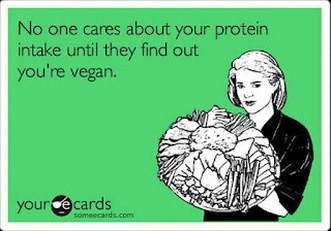
So how much protein do you really need to eat everyday? There are two ways of looking at it (from USDA, both referring to otherwise healthy human beings):
- EAR (Estimated Average Requirement) is an average amount of protein we require. To figure out your EAR multiply 0.5-0.6g of protein x kg body weight (for someone consuming sufficient calories) or approximately 4-5% total calories from protein…That’s all we need to live healthfully!!! So a 130 lb (59 kg) woman would require 30- 35.4g protein daily.
- RDA (Recommended Daily Allowance) is the amount needed for 97-98% of people in age and gender-specific groupings to stay healthy. It’s 0.8g per kg body weight. Our 130 lb (59 kg) woman would then need 47g protein daily, or about 8-10% total daily calories from protein.
17% of the average American’s total daily calories come from protein…70-75% of that protein comes from animal-based sources! Think of it this way: a 3.5oz chicken breast contains 30g of protein! Pair that with a baked potato and a cup of broccoli and you’ve almost hit your daily protein quota in one meal! Start viewing protein as a SIDE KICK and not the SUPERHERO. Especially on Mondays, opt for plant-based forms of protein, not animal ones, for a healthier YOU and planet!
So here’s good news: America is chewing on, albeit slowly, to the scientific literature about the benefits of incorporating more plants into our daily diets. A recent study by Mintel even proved this, claiming that meat-alternatives have officially moved mainstream! 36% of Americans now shop the category, when only 7% declare they’re vegetarians.
But this vegetarian/flexitarian (ME!) tries to limit consumption of mock meats and tofu-based products. Instead, I focus on other plant-based sources of protein to reach my EAR.
- Beans and Legumes are considered the mighty plant-based protein…and with good cause. Per cup, various beans contain 15-20g protein! That’s about 1/3 of the amount most people truly need. Add red beans to salads, dip veggies in hummus, or whip up my black bean burgers to add this plant-based protein into your diet!
- Vegetables. Lean greens have a reputation as an excellent antioxidant source, but are lesser known to be protein superstars. While you can get more protein from some other plant-based sources, don’t cast veggies aside! Your most basic vegetable, a white potato, contains 5g protein! A cup of cooked broccoli and spinach contain 4g and 5g, respectively. Eat a rainbow of veggies to reap the most vitamins, minerals, and protein.
- Soy sources are a new vegetarian’s best friend. Many mock meats are made from soy and soy milk (in my opinion) is the most similar to cow’s milk. Although there’s controversy surrounding soy and it’s health effects, eating a serving several times per week seems to be OK. Try using soy milk (½ cup for 55 calories and 4g protein) in your AM smoothie, add edamame (6g protein per ¼ cup) to a salad, or stir-fry some tofu (½ cup for 88 calories and 10.3g protein) for dinner.
- Whole grains are another excellent source of fiber and protein, not only for #MeatlessMonday, but any day of the week! Per cooked cup, here’s how some favorite grains of mine stack up: Quinoa (200 cals, 8g protein), brown rice (218 cals, 4.5g protein), oats (150 cals, 6g protein), and check out more!
Look how EASY it is for your average 130lb (59kg) woman to consume MORE than a day’s worth of MEATLESS protein (without even eating a salad and NO mock meats!!!) for only 1,500 calories,* 3 servings of fruit, 4-5 servings of vegetables, 3 servings of whole grains, and plenty of healthy fats thrown in:
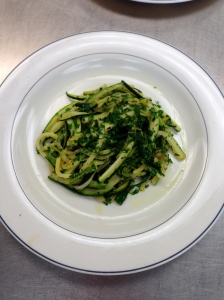



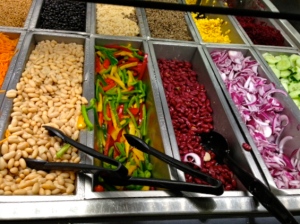
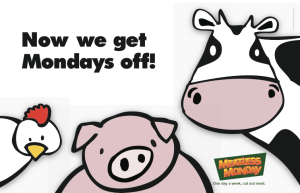
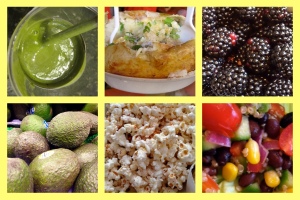
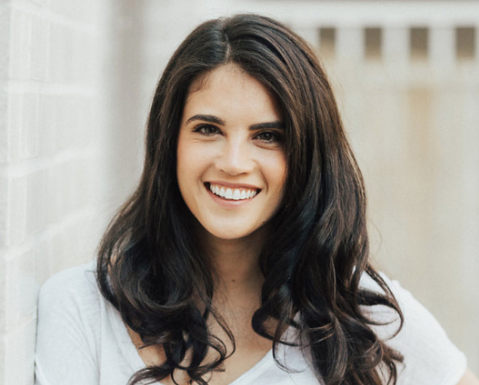 Hi there!
Thanks for stopping by! I'm Chelsey, an online Registered Dietitian, recipe developer, budding photographer, and coffee addict! My mission is to help you feel good through food by answering the question "What should I eat?" Let's make nutrition approachable!
I hope you enjoy my personal collection of simple, healthy, food allergy friendly and nutritiously delicious recipes, plus tips and tons of tricks that will help YOU live a nutritionally-balanced life! I look forward to getting to know you better...
Hi there!
Thanks for stopping by! I'm Chelsey, an online Registered Dietitian, recipe developer, budding photographer, and coffee addict! My mission is to help you feel good through food by answering the question "What should I eat?" Let's make nutrition approachable!
I hope you enjoy my personal collection of simple, healthy, food allergy friendly and nutritiously delicious recipes, plus tips and tons of tricks that will help YOU live a nutritionally-balanced life! I look forward to getting to know you better...








Fabulous source of information and ideas! Our meatless Mondays will start
today. Thank you!